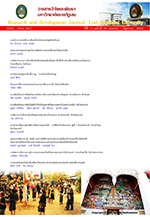รูปแบบการพัฒนาความรู้ เจตคติ และการปฏิบัติงานของเกษตรกร กลุ่มผู้ปลูกข้าวหอมมะลิด้วยปุ๋ยอินทรีย์ โดยความร่วมมือของสำนักงานสภาเกษตรกรและองค์กรปกครองส่วนท้องถิ่นจังหวัดร้อยเอ็ด
Keywords:
ความรู้, เจตคติ, การปฏิบัติงาน, รูปแบบการพัฒนา, เกษตรกรผู้ปลูกข้าวหอมมะลิด้วยปุ๋ยอินทรีย์, knowledge, attitudes, job performance, a model for development, organic jasmine rice farmersAbstract
การวิจัยครั้งนี้มีวัตถุประสงค์การวิจัยเพื่อ 1) ศึกษาปัจจัยที่ส่งผลต่อการพัฒนาความรู้ เจตคติและการปฏิบัติงานของเกษตรกร 2) สร้างรูปแบบที่เหมาะสมในการพัฒนาความรู้ เจตคติและการปฏิบัติงานของเกษตรกร และ 3) ประเมินรูปแบบการพัฒนาความรู้ เจตคติและการปฏิบัติงานของเกษตรกรผู้ปลูกข้าวหอมมะลิด้วยปุ๋ยอินทรีย์ ในจังหวัดร้อยเอ็ด เป็นการวิจัยทั้งเชิงปริมาณและคุณภาพ โดยแบ่งออกเป็น 3 ระยะ ดังนี้ ระยะที่ 1 กลุ่มตัวอย่าง ได้แก่ กลุ่มเกษตรกรผู้ปลูกข้าวหอมมะลิด้วยปุ๋ยอินทรีย์ จำนวน 12 กลุ่ม จำนวน 370 คน เครื่องมือที่ใช้เป็นแบบสอบถาม ระยะที่ 2 กลุ่มตัวอย่างเป้าหมายมีจำนวน 23 คน ได้จากการเลือกเฉพาะเจาะจงและทำการเก็บรวบรวมข้อมูลจากแบบรวบรวมการวิจารณ์และข้อเสนอแนะ ส่วนกลุ่มทดลองที่ใช้ในการวิจัยระยะที่ 3 นี้ ได้แก่ เกษตรกรผู้ปลูกข้าวหอมมะลิด้วยปุ๋ยอินทรีย์ จำนวน 4 กลุ่ม รวมจำนวน 132 คน ใช้แบบสอบถามเป็นเครื่องมือที่ใช้ในการรวบรวมข้อมูล การวิจัยครั้งนี้ใช้สถิติเชิงพรรณนา ได้แก่ ร้อยละ ความถี่ ค่าเฉลี่ยและค่าเบี่ยงเบนมาตรฐาน สถิติทดสอบสมมุติฐานใช้รูปแบบสมการถดถอยพหุ และสถิติที่ใช้ในการเปรียบเทียบใช้การวิเคราะห์ความแปรปรวนหลายตัวแปรตามแบบวัดซ้ำ ผลการวิจัยพบว่า ไปทดลองใช้ ทำให้เกษตรกรผู้ปลูกข้าวหอมมะลิด้วยปุ๋ยอินทรีย์จังหวัดร้อยเอ็ด มีความรู้ เจตคติและการปฏิบัติงานดีขึ้นปัจจัยที่ส่งผลต่อการพัฒนาความรู้ เจตคติ และการปฏิบัติงานของเกษตรกรผู้ปลูกข้าวหอมมะลิด้วยปุ๋ยอินทรีย์ จังหวัดร้อยเอ็ด (Y) ได้แก่ ด้านการเลือกพื้นที่ปลูก ด้านการสนับสนุนทางสังคมเกษตร ด้านการสนับสนุนจากสำนักงานสภาเกษตรกรและองค์กรปกครองส่วนท้องถิ่นจังหวัดร้อยเอ็ด โดยมีค่าสัมประสิทธิ์ถดถอยเท่ากับ 0.363, 0.646 และ 0.380 ตามลาดับ ซึ่งตัวแปรทั้งสามดังกล่าวสามารถอธิบายความแปรปรวนของ (Y) ได้เท่ากับร้อยละ 11.8 ที่ระดับนัยสำคัญทางสถิติ 0.05 ไปทดลองใช้ ทำให้เกษตรกรผู้ปลูกข้าวหอมมะลิด้วยปุ๋ยอินทรีย์จังหวัดร้อยเอ็ด มีความรู้ เจตคติและการปฏิบัติงานดีขึ้น
ปัจจัยทั้งสามด้านมีความเหมาะสมที่นามาจัดทำขึ้นเป็นโครงการ โดยทำแผนการจัดกิจกรรมการพัฒนาความรู้ เจตคติ และการปฏิบัติงานของเกษตรกรผู้ปลูกข้าวหอมมะลิด้วยปุ๋ยอินทรีย์ จังหวัดร้อยเอ็ด ทำให้ได้รูปแบบการพัฒนา 6 ขั้นตอน 15 กิจกรรม ไปทดลองใช้ ทำให้เกษตรกรผู้ปลูกข้าวหอมมะลิด้วยปุ๋ยอินทรีย์จังหวัดร้อยเอ็ด มีความรู้ เจตคติและการปฏิบัติงานดีขึ้น
เมื่อนำรูปแบบการพัฒนาความรู้ เจตคติและการปฏิบัติงานของเกษตรกรผู้ปลูกข้าวหอมมะลิด้วยปุ๋ยอินทรีย์จังหวัดร้อยเอ็ด ไปทดลองใช้ ทำให้เกษตรกรผู้ปลูกข้าวหอมมะลิด้วยปุ๋ยอินทรีย์จังหวัดร้อยเอ็ด มีความรู้ เจตคติและการปฏิบัติงานดีขึ้น
A model for development knowledge, attitudes and job performance of organic jasmine rice rarmers through the cooperation between the office of farmers council and local government organization in Roi-Et province
The purposes of the research were to analyze factors affecting knowledge, attitudes and job performance of organic jasmine rice farmers in Roi-Et province, to design a model for developing knowledge, attitudes and job performance of organic Jasmine rice farmers, and to evaluate the model for developing knowledge, attitudes and job performance. The qualitative research and quantitative research were employed for the study. The research methodology was divided into three steps. Step 1 focused on analyzing factors affecting knowledge, attitudes and job performance of organic jasmine rice farmers. The samples were 370 farmers from organic jasmine rice farmer groups in Roi-Et province. The data were collected by questionnaire from 370 organic jasmine rice farmer groups in Roi-Et province. Step 2 focused on designing and developing a model for developing knowledge, attitudes and job performance of organic Jasmine rice farmers through focus group discussion method of 23 experts, and the target population. Step 3 implemented and evaluated the model of 132 organic Jasmine rice farmers from four groups. The tools were a training curriculum, a test, an assessment form, and a questionnaire. The research statistics used were percentage, frequency, mean, standard deviation, multiple regression analysis and repeats measures MANOVA were used to test hypothesis. Results of the research were summarized as follows:
The factors affecting knowledge, attitudes and job performance of organic jasmine rice farmers in Roi-Et province were: area planted aspect, social agricultural supporting aspect, and supporting from Farmers Council and Local Government Organization in Roi-Et Province aspect. Regression coefficients were 0.363, 0.646, and 0.380, respectively. Such variables could explain variation in affecting for developing knowledge, attitudes and job performance of organic Jasmine rice farmers at 11.8 percent of population with a significant level of 0.05.
The result showed that a construct of a model for developing knowledge, attitudes and job performance of organic Jasmine rice farmers from three factors on the prepared project was appropriate. The model yielded six steps and fifteen activities.
The test of the model for developing knowledge, attitudes and job performance, organic jasmine rice farmers in Roi-Et province revealed that organic jasmine rice farmers in Roi-Et province had better knowledge, attitudes and job performance.
Downloads
How to Cite
Issue
Section
License
ข้อความที่ปรากฎในวารสารฉบับนี้เป็นความคิดเห็นของผู้เขียนแต่ละท่าน สถาบันวิจัยและพัฒนา มหาวิทยาลัยราชภัฏเลย และกองบรรณาธิการ ไม่จำเป็นต้องเห็นด้วยและไม่มีส่วนรับผิดชอบใดๆ
สถาบันวิจัยและพัฒนา มหาวิทยาลัยราชภัฏเลย ขอให้ผู้อ่านอ้างอิงในกรณีที่ท่านคัดลอกเนื้อหาบทความในวารสารฉบับนี้






